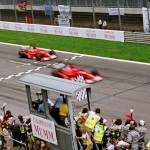Where I come from, there tends to be two kinds of boys. Car boys and football boys. You can like both of course, but essentially you know at some point you are going to have to choose. Are you a Top Gear guy or a Match of the Day man? It may be a sociological problem at some level, but the fact remains that despite sharing the tag of being “sports”, football and motor racing are poles apart.
After the debate stirred up by my dissection of cricket and football recently- all criticism welcome and in most cases deserved- the time has come to take on the four-wheeled, money-making beast that is Formula One. Why does football trump this sport so comprehensively, even in a week when arguably the greatest Champion in the history of F1– Michael Schumacher, announced his stunning (and compassionate) return to the cockpit to replace injured friend Felipe Massa.
1. Safety
 Only one place to start really, this would have been the number one issue even if it hadn’t been for the events at the Hungaroring last month. Football has its risks, injuries certainly are a far more common occurrence in the modern age than they ever have been, but in a wider sense an injury is not necessarily the end of the world. Muscle strain? Few weeks out. Broken leg? Few months out. Despite being very much a contact sport, football is relatively low on the danger scale.
Only one place to start really, this would have been the number one issue even if it hadn’t been for the events at the Hungaroring last month. Football has its risks, injuries certainly are a far more common occurrence in the modern age than they ever have been, but in a wider sense an injury is not necessarily the end of the world. Muscle strain? Few weeks out. Broken leg? Few months out. Despite being very much a contact sport, football is relatively low on the danger scale.
Formula One, on the other hand, has to be right up near the top of said scale. Anyone who complains about the money paid to top drivers would do well to remember that these guys are driving at breakneck speeds, in cars designed to go as fast as possible. Safety standards have undoubtedly improved, but it took the deaths of Roland Ratzenberger & three times World Champions Ayrton Senna during the same weekend at the 1994 San Marino GP to see safety elevated to a primary issue.
Ratzenberger died when a front wing deficiency caused his car to smash into a wall at almost 315km/h during a practice session, fracturing his skull fatally. Just a day later Senna, already disturbed by both the Ratzenberger incident and another serious crash involving his countryman Rubens Barrichello in another practise session, ran straight off the track at a high speed corner (telemetry shows Senna left the track at 310km/h but had managed to slow to around 219km/h at the time of impact). The Brazilian suffered fatal head injuries, believed to be caused by impact made by the car’s front wheel smashing into his helmet, and despite the best efforts of the F1 medical squad, he was pronounced dead later in the day.
These incidents prompted a number of serious changes to the sport, most of which have been hugely successful. The structure of F1 cars, which were previously geared exclusively towards speed, became more safety-orientated, concrete walls were replaced by tyre barriers and driver safety became an ongoing concern. Statistics show that Formula One’s safety record over the fifteen years since Imola 94 is commendable, but still the risk persists, as seen with the Massa incident at Hungary recently.
There, the Ferrari driver was hit by a suspension spring which had broken off the front of Barrichello’s car. The metal spring left a four inch gash in the reinforced helmet worn by Massa, and also penetrated his visor, causing a deep gash in his head, and fracturing his skull. Not forgetting of course that the Brazilian was travelling at around 200km/h at the time of impact, and continued his journey- unconscious- head on into a tyre barrier. Massa is not expected to compete again this year, but in truth he is lucky to be alive.
The facts are, although Formula One is a sport which has made incredible strides in terms of safety- you only need to look at the innovations made by teams such as Lotus & Ferrari in the last forty or so years to see this- drivers still find themselves at risk every time they step into the cockpit. Additionally, human error can prove fatal, whereas in football human error can cause a loss of goals, points or at worst trophies. For example, even during the same race on Sunday, Fernando Alonso saw his front right wheel fly loose across the track after an error during a pitstop. At the pace F1 cars drive, a loose wheel could kill.
Ok that was a bit morbid to begin with, but it is a valid point in my opinion. Safety is as important in sport as it is in life, and in that respect Formula One still has a way to go.
2. Politics

The sport is governed by the Fédération Internationale de l’Automobile (FIA), which houses a collation of the organisation’s many member groups. Its president is a man not unfamiliar with controversy, Max Mosley. Without going too deeply into his sexual peccadilloes, Mr Mosley’s credibility has suffered greatly over the past year and a half as a string of lurid stories have appeared concerning his personal life. It is fair to say that his imminent bid for re-election in October should be an interesting campaign.
Either way, whoever is in charge (Mosley has been since 1993), seems unable to stop the issues which are blighting competition in F1. Namely the confusion surrounding rules and regulations, which have dogged recent seasons and threatened this one before it had even began. In 2005 we had the farce of the US Grand Prix, in which only six cars competed due to safety fears regarding tyres, which were not handled effectively by the FIA. Last season we saw numerous punishments doled out at an alarming rate, often well after the race had been completed. Lewis Hamilton suffered from this at the Belgium Grand Prix, a race he had seemingly won. However, stewards ruled that he had performed an illegal manoeuvre in cutting a chicane (in a bid to avoid smashing into Ferrari’s Kimi Räikkönen by the way), and gave him a post-race penalty of 25 seconds, changing not just the result of the race but also the make-up of the Championship.
Of course I am not ignorant enough to believe that such punishments are meted out without reason. My issue is with a sport in which the final result of a contest can be amended. Imagine fans of Hamilton who would pay good money to watch their hero race, win, and then find out when they get home that he has been demoted. The FIA and race stewards have a duty to govern the sport, but I think it is fair to say they haven’t found a perfect way to do so as of yet. Their enforcements of rules are often haphazard and inconsistent, a sure-fire indicator of the political unrest which runs through the sport like the word “Blackpool” on a stick of rock. Say what you like about Sepp Blatter and FIFA, but one thing he does not (on the face of it at least) have the power to do is to influence the result of a football game, and fans can leave a match happy that the result they have just witnessed will be the result when they wake up the following morning.
3. The future

The sport is currently at the centre of an ongoing feud between the FIA and the Formula One Teams Association (FOTA), with the main sticking point being an agreed £40m budget cap on all teams for the 2010 season. The FOTA argued that such a restriction would result in a two-tier Championship, with bigger teams granted greater technical freedom. When showdown talks between the two parties broke down, four teams- Ferrari, Toro Rosso, Renault & Red Bull- threatened to withdraw from the 2010 Championship, and talk of a breakaway Championship soon emerged.
Legal action was threatened, the first team to cross the picket-line and confirm their entry for 2010- Williams- were banned indefinitely from FOTA, as were Force India. The eight remaining members of FOTA went back and forth, issuing threats, demands and lawsuits, and it was only in June that some sort of agreement was reached between the two parties.
4. Meritocracy

Formula One, it seems, is very different. A good driver can be rendered useless by a dud car, a slow team or bad tactics. Lewis Hamilton was the youngest Champion in F1 history last year, shining with his aggressive driving style, tactical nous and cool temperament. He still possesses all those attributes this season too. But what he also possesses is a car that he has at various times this season described as “dead slow”. Indeed, Sunday’s success in Hungary was Hamilton’s first podium finish of the season, and took his points tally to just 19- a full 51 points behind Championship leader Jenson Button. Putting that into context for a second, Button last season drove for the Honda team, and picked up just three points throughout the entire season.
Who is the better driver? We will probably never know until all cars are identical- which is unlikely to happen any time soon. Many consider the likes of Michael Schumacher & Ayrton Senna to be the best drivers of the modern era, but who knows if lesser lites such as Gerhard Berger or Jean Alesi may have had such success with the (full) backing of McLaren or Ferrari? If you ask me, football provides a far more reassuring, and transparent, level of meritocracy. We know who is good and who isn’t, and talent is easier to spot and admire.
5. Team Orders or Race Fixing?

Team orders within Formula One are common. In truth, most teams have a hierarchy among their two drivers, with one driver preferred above another. This driver will often be the beneficiary of a more aggressive strategy, more technical improvement and, in some cases, scandalously, staged track position.
Schumacher was the master benefactor of this, during his time at Ferrari the German would often inherit wins from team-mate Rubens Barrichello, who would slow down to allow his colleague past, in order to assist his World title charge. A nice bit of team-work? Or plain race-fixing? I think it is the latter. If Barrichello drove a better race than Schumacher, he deserves the win. Simple. Handing it to a slower driver devalues the whole competitive spirit of the sport, not to mention cheapening the career of both drivers. Why wouldn’t Schumacher want to win a race fairly on the track? Kimi Räikkönen inherited a World Championship a few seasons later at Brazil having been waved through by team-mate Felipe Massa, but to me it left a sour taste as he was clearly not the best driver during that race, winning only due to team orders.
I know it is hard to cross-contextualise between sports, but it is the equivalent of the fixed football match. There are unconfirmed instances where such collusion has taken place in football- Germany v Austria in 1982, Coventry v Bristol City in 1977– and experts suggest that end of season match collusion is rife in Italy & Spain, but these instances are widely considered to be scandals, insults to the game’s integrity. In Formula One, team orders (a.k.a. race fixing) is considered par for the course. Not good.
So there you have it, first cricket, now formula one. Is there any sport that can top football? Keep reading to find out.
Also Read: 10 Reasons why Football is better than Cricket.
Add Sportslens to your Google News Feed!